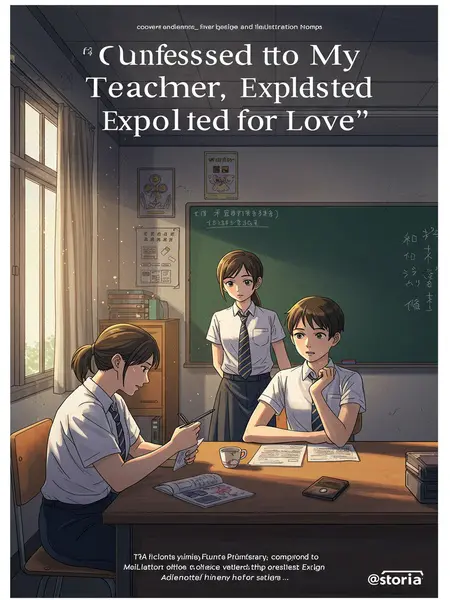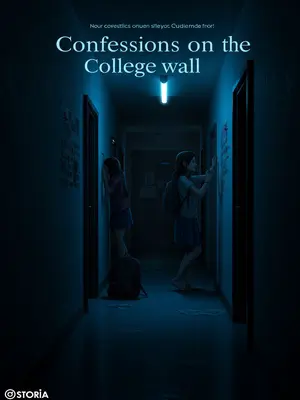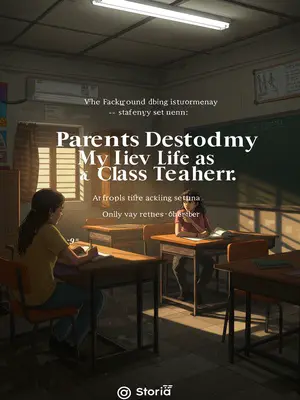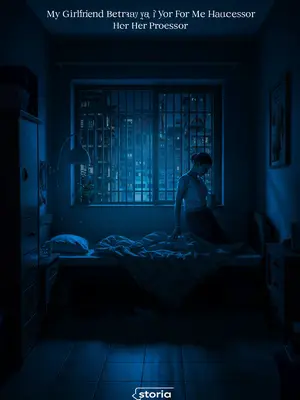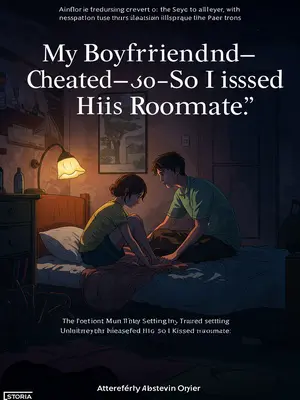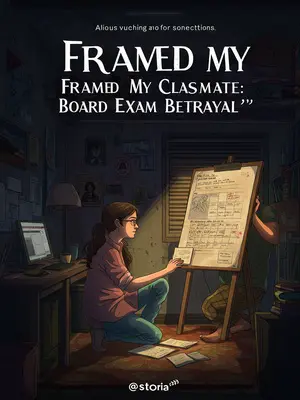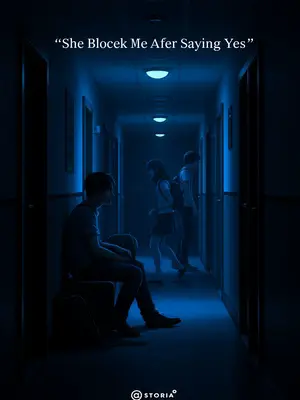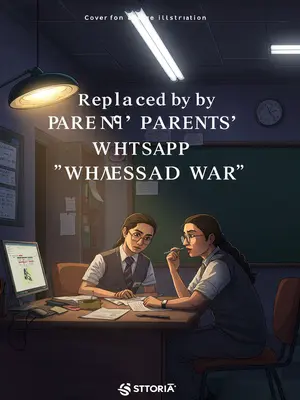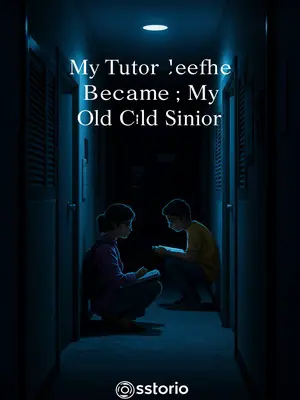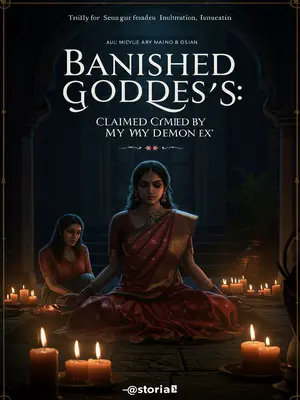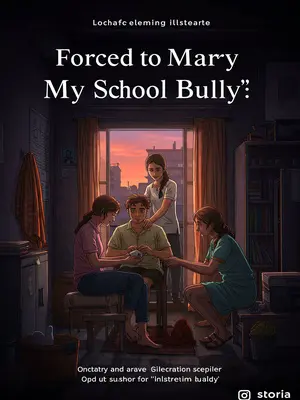Chapter 1: Love Letter Exposed
The moment the teacher held up the folded letter, my mouth went dry. Sweat trickled down my back, sticky and cold, and I could hear the impatient thump-thump of her sandal on the terrazzo floor. Before she even called for my parents, my heart was already racing—like the Virar Fast tearing through the suburbs—wishing, yaar, that the earth would swallow me whole. This is worse than failing maths.
The teacher’s voice sliced through the air, calm but sharp as a ruler’s edge. The classroom shrank around me. The tube lights buzzed overhead, and the air was thick with the smell of old textbooks and coconut oil. Behind me, whispers tangled with the ceiling fans and chalk dust. In the corridor, someone’s rubber slippers slapped against the stone, breaking the tension for just a second.
My mind ran faster than any local train. I wished, just for a moment, that Ganpati Bappa would rescue me—Bappa, if you save me from this, I’ll even give up Maggi for a whole month, promise!
Because the girl I love so deeply—
—is the class teacher herself.
Hai Bhagwan, what have I done? My ears burned as if someone had twisted them, but what really made my knees weak was the thought of my feelings being uncovered in front of everyone—especially her. I chewed the inside of my cheek, eyes locked to my torn Bata shoes, not daring to look up at her face.
I wanted to shout, to run, to do anything to stop this, but my father’s hand pressed down on my shoulder, heavy and unmoving. His grip wasn’t just physical—it was all the family’s izzat, every bit of reputation we still had, weighing on me. His lips were a straight, thin line, moustache trembling, and he stared past me as if the floor tiles would open up and swallow us both. The scent of his aftershave mixed with a faint whiff of brick dust from the morning’s site.
My mother stood alone on the dais, her body shaking with shame. Her saree pallu slipped off her shoulder as she twisted it between her hands, knuckles white. She looked at me—her eyes filled with worry, pleading, but she straightened her back. Years of raising me alone had given her a spine of steel, even now.
The class teacher’s voice rang out, cold as steel. "This is your final year, the most important time in your life, but some students clearly have their minds elsewhere. Who knows what’s going on in their heads?"
She had the authority of someone who’d broken up a hundred fights behind the cycle stand. The students in the front row shrank back, and even the tube lights seemed to flicker, as if scared. She looked straight at me, eyes sharp behind her thick spectacles, lips pursed like she’d bitten into a green chilli.
She picked up my letter and continued, "I found this during the morning assembly, while checking your desk. Now, let your mother read it aloud, with feeling. 'Dear who?' Who is your 'dear'?"
A few boys tried to hide their laughter behind their notebooks, while the girls exchanged wide-eyed glances, already composing WhatsApp updates in their heads. Meena aunty, the ayah, peeped in through the window, her face a perfect circle of curiosity. My cheeks flamed, but I clenched my fists and stared at the dusty floor.
The teacher handed the letter to my mother.
For a second, my mother’s hand hovered, shaking, before she took the paper. She looked at the teacher, then at me, and then at all the children she’d seen grow up from LKG. The silence was so thick, even the ticking wall clock sounded too loud. She adjusted her bindi with a trembling finger and dabbed her eyes with her pallu, struggling to hold herself together with all the small, familiar gestures of an Indian mother.
She pleaded, barely above a whisper, "Madam, bachcha ka bhi kuch izzat hai. Ghar pe baat kar sakte hain na?"
Her voice cracked, but her dignity fought her desperation. Some girls looked away, suddenly uneasy. One boy in the corner stopped chewing his pen, frozen by the seriousness.
"Early romance is the one thing our school cannot tolerate," the teacher snapped. "If I don’t make an example, how will I manage this class?"
She crossed her arms, chin high, her authority as clear as her starched dupatta. Everyone knew—after today, no one would dare write a love letter, at least not in ink. The air inside the room was electric, everyone dreading collective punishment.
My mother tried once more, voice rising, "Mera beta sirf letter likha hai, diya bhi nahi. Socha tha, board ke baad hi dega."
She looked to my father, hoping for help, but he only stared at the floor, jaw clenched, refusing to look up.
"It’s wrong for him to even have such thoughts. If you’re not willing to read it now, take him home for a week. Let him reflect."
A gasp ran through the class. Missing a week in final year—during board prep—was unthinkable. Even fever didn’t count as an excuse unless it was typhoid or someone had died.
My mother fell silent, lips pressed together, defeated. She clutched the letter, and I saw tears glinting in her eyes. Someone in the back whispered, quickly silenced by the teacher’s glare.
My father couldn’t help but plead, "Madam, then we’ll read. Agar ek hafta class miss ho gaya toh board ka kya hoga?" He rubbed his palms together, as if hoping for some miracle. His voice was rough, not used to begging, but the fear of my failing was bigger than his pride.
The teacher nodded, "Fine. Read it aloud, so everyone hears. Who is his 'dear'?"
Excitement flickered in a few students’ eyes. There was a thrill in watching an adult, even someone’s mother, be dragged into such a scene. My mother’s fingers trembled as she unfolded the paper, her bangles jangling, betraying her nerves.
She began, voice barely above a whisper: "I still remember your gentle gaze, your hair falling across your shoulders in the evening sun, carrying a faint scent of jasmine. I don’t know why you wear glasses now, hair tied in a ponytail, always acting so strict."
Her words filled the room, heavy with longing. Some students shifted uncomfortably, unsure whether to laugh or keep quiet. The teacher’s face was unreadable, but I caught a flicker in her eyes.
The entire class stared at me in shock. I felt like a frog in biology class, pinned for everyone to see. Even Hari Bhaiya, the peon, paused at the door, eyes wide. I kept my gaze fixed on the cracks in the cement.
The teacher pushed her glasses up, flicked her ponytail, and sneered, "Seems the girl you like is quite self-aware—knows this year is important, hides her beauty, focuses on studies. But you? Only bakwaas in your head."
Her words stung, but something in the way she adjusted her spectacles reminded me of all those evenings at tuition, her patient explanations. Her voice, usually gentle, now cut like a blade.
I looked at her, dazed. She was still so beautiful—her laughter in the soft light, the chime of her anklet, the jasmine oil in her hair. The memory was alive, untouched by time.
Back then, in the evening, her hair loose and fragrant with jasmine, she kissed my forehead. Her lips tasted like rose lip balm. My lips were cracked, and she cupped my face, gently applying her own balm, scolding me for being stubborn. I closed my eyes, shy, and she chuckled, dabbing my lips with such care.
The words sounded so intimate, even my mother’s voice faltered. The class had gone silent. Only the tick-tock of the wall clock and the distant horn of an auto rickshaw broke the hush. The smell of roasted peanuts from outside floated in, oddly comforting in that tense moment.
